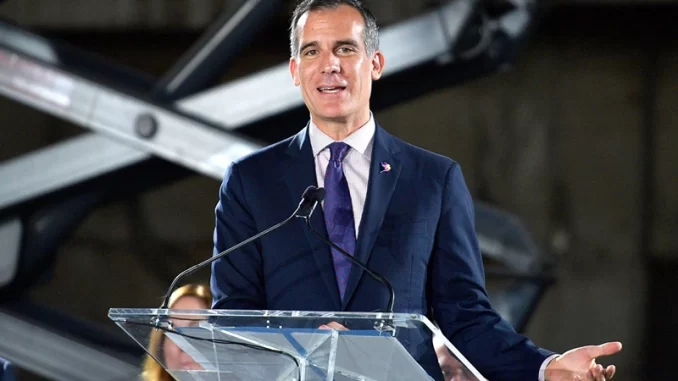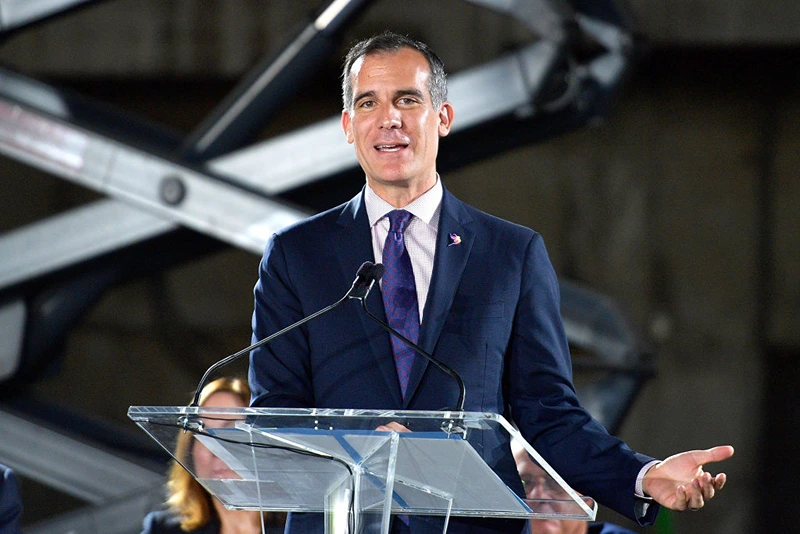

OAN Roy Francis
UPDATED 8:43 AM PT – Thursday, March 16, 2023
The Senate voted 52-42 to confirm former Los Angeles Mayor Eric Garcetti as the next United States ambassador to India on Wednesday.
The U.S. ambassador job in India has been vacant for the past 26 months, marking the longest stretch for that position. The Senate confirmed Garcetti a year and a half after president Joe Biden had nominated him.
The Senate was divided on the decision, and the nomination was held up partly due to concerns about how Garcetti handled sexual misconduct claims against one of his former aides while he served as mayor.
Garcetti is a prominent Democrat who had also served as co-chair of Biden’s presidential campaign. He was nominated for the position of Ambassador to India in July 2021, then in March 2022, Senator Charles Grassley (R-Iowa) had placed a hold on the nomination process.
Two months later in May 2022, Grassley released a report in which he detailed multiple accusations of sexual harassment. The accusations were made against former Deputy Chief of Staff Rick Jacobs who had worked with Garcetti while he was serving as Mayor in Los Angeles.
“Based on a preponderance of the evidence,” the report said. “We conclude that Mayor Garcetti likely knew or should have known that Rick Jacobs was sexually harassing multiple individuals and making racist comments towards others.”
Garcetti had maintained that he had no knowledge of any inappropriate behavior, while Jacobs said that the 2020 sexual harassment lawsuit was a “work of pure fiction” denying the accusations.
On Monday, Naomi Seligman, who had previously worked for Garcetti as a communications director told CNN that he is not a good choice for the role. She said that Garcetti was “unfit to become an ambassador or really hold to public office anywhere in this country or this world.”
“Unfortunately, the White House has put undue pressure on Democrats to vote for Eric Garcetti because Eric Garcetti has been a very, very loyal person to President Biden, and that’s unfortunate,” Seligman said. “These senators that purport to support #MeToo cannot just do it when it’s politically expedient. They have to do it when it matters, even if it’s your own political party.”
Even though the White House supported Garcetti and relayed their confidence in him, some Democrats held private reservations due to the allegations.
Early on Wednesday, uncertainty rose again among Democrats on whether the former mayor would have the support he needed to get through a procedural vote. However, even though a few Democrats voted against him, enough Republicans crossed the party line and helped the nomination to be confirmed.
When Garcetti addressed the committee during the nomination process, he said that his priorities would be to champion economic and defense partnerships, as well as “respect for human rights and strong democratic institutions.
“The bedrock of our partnership are the human ties that connect our nations, embodied by the 4 million-strong Indian American diaspora that strengthens our nation and the nearly 200,000 Indian students and tens of thousands of Indian professionals who contribute to our economy,” he said. “In addition, respect for human rights and strong democratic institutions are key elements of our strategic partnership and values enshrined in our constitutions, and if confirmed, I will engage closely and regularly with the Indian government on these issues.”
Senate Majority Leader Charles E. Schumer (D-N.Y.) commented on the procedure after the nomination was confirmed.
“The United States-India relationship is extremely important,” he said. “And it’s a very good thing we now have an ambassador.”
The Republicans who had voted in favor of Garcetti were Senators Susan Collins (R-Maine), Bill Cassidy (R-La.), Lindsey Graham (R-S.C.), Bill Hagerty (R-Tenn.), Roger Marshall (R-Kan.) and Todd Young (R-Ind.). The Democrats that opposed the nomination were Senators Sherrod Brown (D-Ohio), Mazie Hirono (D-Hawaii), and Mark Kelly (D-Ariz.).

Be the first to comment